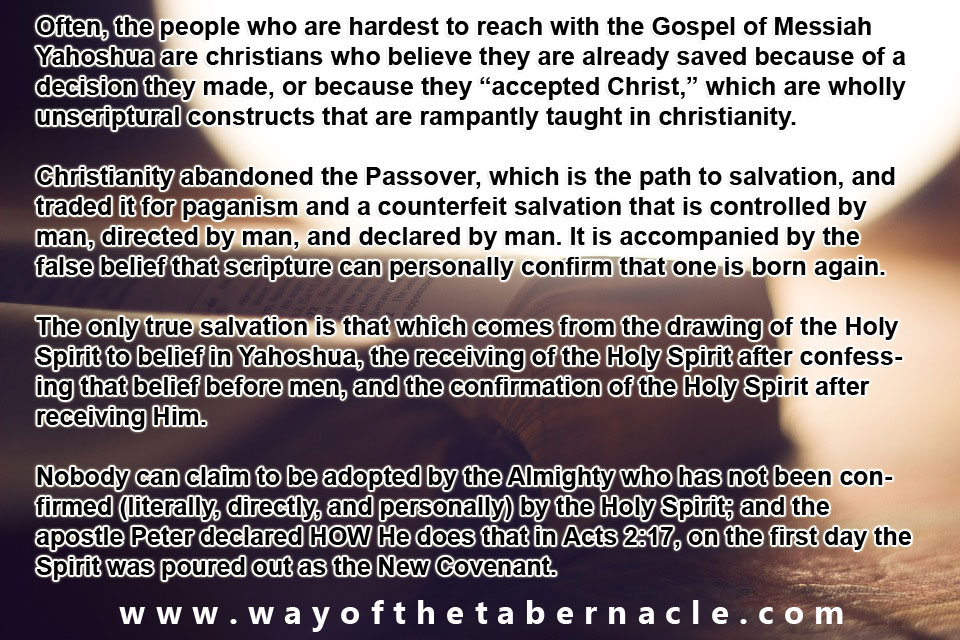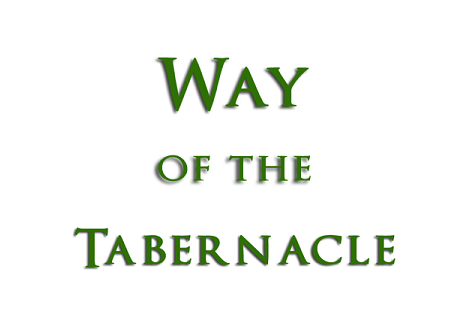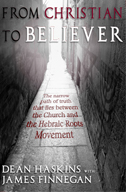HOW DO YOU KNOW YOU ARE SAVED?
Depending on the denomination of the person asked, one will get varied answers to this question. Roman Catholics, while having to admit they have no real guarantee of salvation (they just hope they've accumulated enough “brownie points”), will tell you that it is through the keeping of Roman Catholicism's sacraments. A Charismatic will likely tell you that the proof of his salvation is found in his outward display of the “gifts of the Spirit” (speaking in tongues, healing, etc.). And, a Protestant or a Baptist will emphatically declare that he knows he is saved because the “Bible tells him so” (even though, when pressed, he will not be able to turn to any verse and show you his name). Does that mean that those who lived before the advent of the printing press had no eternal security?
This one question is the basis for every “Christian” denomination in existence: what is it that gives me assurance of my salvation?
How is it that any child knows that his father is his father? At its very core, the answer to that question is that the father tells his child that he is his. Through varied expressions of it, children (whether biological or adopted) know their father is their father because he tells them so. What does the Bible tell us about how our heavenly Father confirms that we are His children?
Not surprisingly, the answer to that can be found in that which was outlawed by Constantine and his Roman partners in crime because of their hatred of the Jews. The Passover Seder contains an element called the “haggadah,” which is the “telling,” or the “testimony.” For the Old Testament saint observing the Passover, the haggadah was the passing down of the story of how Yah freed Israel from slavery in Egypt, which resulted in the Hebrew children receiving their covenant (Ten Commandments) from Yah.
Those stone tablets were then housed within the Ark of the Covenant, but interestingly, Yah referred to it as the “Ark of the Testimony” (Exodus 39:35). The Ark actually symbolized the bride of Yahoshua, as the stone tablets represented the Law of Yah (the Holy Spirit), Aaron's rod represented the power of Yah, and the manna represented the provisions of Yah. Since the pouring out of the Holy Spirit upon mankind, these are what are placed inside each member of the bride of Yahoshua—Yah's children.
So, while the haggadah, or testimony, of Old Testaments saints was a telling of how they received Yah's confirmation by being led out of Egypt (which is a type of the world), and being given the Ten Commandments, the haggadah of the New Covenant is the testimony of the believer being brought out of the world, and the fulfilled Law of Yah indwelling him.
In 2 Corinthians 3, it is explained that the written law of the Old Covenant was physically handwritten by Yah on tablets of stone, but the fulfilled, perfected Law is written on the believer's heart. That New Covenant, or fulfilled Law of Yah, is the Holy Spirit, which was symbolized under the Old Covenant as Yah's written law. Under the New Covenant, the commandments of Yah are transmitted to the believer through His Holy Spirit. No longer are we bound to an external force—written rules and regulations—but guided by an internal one, who tells us Yah's will (His commandments).
But, what does this have to do with assurance of salvation?
In Romans 8:14-17, Paul tells us, “For as many as are led by the Spirit of Yah, they are the sons of Yah. For ye have not received the spirit of bondage again to fear; but ye have received the Spirit of adoption, whereby we cry, Abba, Father. The Spirit itself beareth witness with our spirit, that we are the children of Yah: And if children, then heirs; heirs of Yah, and joint-heirs with Christ; if so be that we suffer with him, that we may be also glorified together.”
There is an important clarification that must be made at this point. As we have already seen, the words of scripture having been inspired by the Holy Spirit, He is the final arbiter in their meanings. Additionally, only the actual autographs, or original manuscripts, contain His inerrant, infallible, inspired words. Every translation of the Bible is the work of fallible humans, and while those people have most often attempted to portray, to the best of their abilities, the meanings of the original words, man is limited. And, “most often” is an important phrase here, for, as we've shown, translations like the Hebraic Roots Bible contains purposeful deception.
In Acts 17, we read about a group of believers who lived in Berea. Verse 11 states, “These were more noble than those in Thessalonica, in that they received the Word with all readiness of mind, and searched the scriptures daily, whether those things were so.” This verse actually tells us something crucial about understanding scripture. They received the “Word,” which signifies the instruction of the Holy Spirit, and then examined the scriptures to see if those things were true. The Holy Spirit will never contradict His scriptures, but He will illuminate the true meanings of them. Moreover, this verse delineates between the Word (logos) and the scriptures.
So, in Romans 8:16, we're told, “The Spirit itself beareth witness with our spirit, that we are the children of God.” but what does the phrase, “beareth witness with” mean? The Greek word here is υμμαρτυρέω, or summartureō. To better understand the true meaning of that word, we must examine the scriptures to see if it is used anywhere else that might help us glean the full meaning of the word; and, we find that word used also in Revelation 22:18: “For I testify unto (summartureō) every man that heareth the words of the prophecy of this book, If any man shall add unto these things, Yah shall add unto him the plagues that are written in this book.”
Here, we see a minor variance in meaning that actually makes a big difference in what is being said in Romans 8:16. Using the meaning of the word that we find in Revelation 22:18, we can understand Romans 8:16 to say, “The Spirit itself testifies unto our spirit, that we are the children of Yah.”
So, the Spirit of Yah “testifies to” our spirit that we are Yah's children. But, what does that really mean? I think that most professing believers, who rely on what they are taught by their churches, consider this “bearing witness” to be, basically, a gut feeling—maybe a function of their consciences. What does Yah's Word tell us about how the Holy Spirit bears witness, or testifies to our spirit?
The prophet Joel foretold how the Holy Spirit would provide us with the testimony of Yah: And it shall come to pass afterward, that I will pour out my spirit upon all flesh; and your sons and your daughters shall prophesy, your old men shall dream dreams, your young men shall see visions (Joel 2:28).
Now, to “prophesy” just means to tell Yah's truth. That often can mean regarding future events, but specifically here, it refers to the truth that Yah gives to the believer—or the testimony he receives from the Holy Spirit—his haggadah. And, remember, Yah called the Ark of the Covenant the “Ark of the Testimony.” But, is this prophecy of Joel actually confirmed in the New Testament? Is this really how Yah tells us that we are His children?
In Acts 2:17 we're told: “And it shall come to pass in the last days, saith Yah, I will pour out of my Spirit upon all flesh: and your sons and your daughters shall prophesy, and your young men shall see visions, and your old men shall dream dreams.” Here, the apostle Peter is declaring that he recognized what happened at Pentecost (Feast of Weeks) to be exactly what the prophet Joel had prophesied. It was the fulfillment of that feast by the real substance (the giving of the Holy Spirit) of the foreshadow (the giving of the Ten Commandments). And, by quoting Joel, Peter was explicit about what happens when the Holy Spirit is “poured out” onto somebody.
It is important to understand here that, according to scriptures such as Number 23:19, Hebrews 13:8, and James 1:17, Yah never changes; and, the corollary to that is, if the Father never changes, then neither do the Son or the Holy Spirit (John 17:22).
Yah specifically tells us that His Spirit will testify to our spirit by giving us visions and dreams. A believer will be told in a dream or a vision that He is a child of Yah. The dream will be personal to the dreamer, but it will be a specific message that confirms that he is Yah's child. And, what are we to do with that testimony from the Creator? It is His truth, and the one who receives Yah's truth is to tell it to others—to testify.
But, many might ask, doesn't the Bible teach us that believing, repenting, and being baptized automatically results in one being saved? Romans 8:9 tells us, “But if anyone does not have the Spirit of Christ, he does not belong to Him.” Acts 8 recounts for us a group of Samaritans who had believed in Yahoshua, and had been baptized in His name, but had not yet received the Holy Spirit. Now, what does Romans 8:9 tell us about them at that point?
We will know that we are the children of Yah because He will tell us that we are His children—personally. But, what about the thief on the cross, since he actually is our model for salvation (he did everything necessary to be redeemed)? He received his haggadah directly from his Savior when He told the thief that he would be “with me in paradise. (Luke 23:43).”
Does one receive his haggadah immediately upon belief in Yahoshua the Messiah? Maybe. But, according to Acts 8, it is not always that way. So, how long does it take? Contrary to what much of the church teaches, salvation is not a cookie-cutter formula. It is vastly personal. It took the Hebrew children some fifty days from the time they were drawn out of slavery in Egypt to receive their covenant. Because of their disobedience, they then wandered forty years before being able to enter the Promised Land (a foreshadow of heaven). The thief on the cross received his confirmation immediately. The key here is faith—the faith that saved Abraham is the faith that still saves us today. And, what Bible did Abraham have to provide his assurance of being Yah's child? Our Bible did not yet exist. Again, the Holy Spirit has never changed.
Well, then, are all the things I've been taught and have believed for so long just been a waste? You're reading this, aren't you? Yah will always direct His children to the truth. For many, that journey is a lengthy one; for others, they might not have to go through the often difficult process of “unlearning” the things they've been taught, and have believed, that are actually false. But, for those who do, it is certainly a lesson in humility—for it's one of the hardest things one ever has to do. Coming to a point where one honestly states to himself and his Savior that he has been wrong in what he has strongly believed is never an easy step for anyone to take. But, it is a necessary step toward knowing Yah and trusting in the name of His Son.
When it comes to following Yahoshua, going back to the perspective of His earliest followers, and the way they lived that faith practically, is the best way to the truth. Understand that the obfuscation of who the Messiah is was one of the most devastating things the enemy ever accomplished. This fundamental truth of Yah, the absolute core of our assurance of salvation, is like so many other things you have likely never learned from the Constantinian church; but, what an assurance to know that our heavenly Father loves His children on a personal level, and wants to tell His children that they are His!
Just consider this: if a neighborhood child started telling everyone that he was a member of your household, would that make it so? Who determines who is a member of your house? Man does not declare he is born again—either by claiming it apart from the confirmation of the Holy Spirit, or any person, be they a preacher or a teacher, evangelist or personal friend, stating that another person is born again (something that happens often in many churches). No, the Holy Spirit alone confirms those who are Yah's children—and, He does so directly to those whom He indwells.

Written by Dean Haskins for Way of the Tabernacle. Reproductions with proper attribution are allowed and encouraged.
Salvation
Traditions
Other Truths
But now in Yahoshua the Messiah you who formerly were far off have been brought near by the blood of Christ. For He Himself is our peace, who made both groups into one and broke down the barrier of the dividing wall, by abolishing in His flesh the enmity, which is the Law of commandments contained in ordinances, so that in Himself He might make the two into one new man, thus establishing peace, and might reconcile them both in one body to Yah through the cross, by it having put to death the enmity. Ephesians 2:13-16




